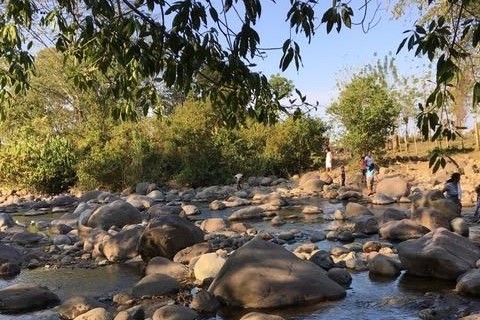Many people have lost touch with realities such farming and care for the land. Some folks think food comes from the grocery store and give little thought to how food, products or energy are produced.
Honduras is one of many places around the world where ecosystems have been disrupted and natural resources are being exploited in the name of profit. In the process, farmers are being forced from their farms and homelands. Their desperate situations aren't known or understood by the people and policymakers in those nations to which they flee. Sisters have taken an active role in bringing their stories to light.
This article is about sisters who seek out the source of a societal challenge – immigration. They explored why people were leaving Honduras to come to the United States. We can discover a source of the problem simply by searching our cabinets and countertops. Palm oil is found in many foods and products we use every day. Raising awareness of realities that we take for granted can change consumer habits and, eventually, lives.
Create a consumer search for items that include palm oil. This can be done in a variety of ways, including:
- Assigning students to search the cupboards and countertops of their homes.
- Doing online searches for the ingredient lists of products they use every day.
- Taking a field trip to a local grocery store.
- Bringing items from your home into the classroom (note that students potentially could judge or damage your items).
This article provides a list of products that contain palm oil, as well as tips on what to look for on ingredient labels. Consider adding an element of competition by offering points or incentives for the number of items that students discover or the more obscure mentions of palm oil that they find.
After the search exercise, say: "Palm oil is commonly found in many things we eat and use, including candy, snacks, cereals, ice cream, instant noodles, nut spreads, soap and cosmetics. It's hard to avoid using.
As the story we'll explore points out, a lot of farmland in tropical climates was first exploited by the banana industry and, more recently, by palm oil producers. Some of this was land that small farmers used to grow food for their families and communities. Policies of large corporations have hurt the environment and forced people to make hard decisions, including leaving their homelands."
In small groups or as a class, invite students to discuss:
- What emotions do you feel as you discover the widespread use of palm oil? Are you surprised, disturbed, overwhelmed…
- How might knowing a little about the effects of the palm oil industry on Honduran farmers affect your own choices as a consumer?
- What difference might you individually or as a class or other group, be able to make to improve the lives of Hondurans?
Good and gracious God, you alone can do wonderful things with the simplest of elements – seed and soil, sun and rain.
You grace us with the intellect to share in the act of creation and in the blessings of its fruits.
Bless us also with the vision to look beyond shopping lists and price tags and labels to see the impact our choices make on nature and neighbors. Give us wisdom and courage to make choices that reflect your love for all creation.
Amen.
Please give us your feedback! Fill out a quick survey about this lesson and how we can serve you better. Remember that its title is "Hondurans care for the earth"
Tell us what you think about this resource, or give us ideas for other resources you'd like to see, by contacting us at [email protected]
